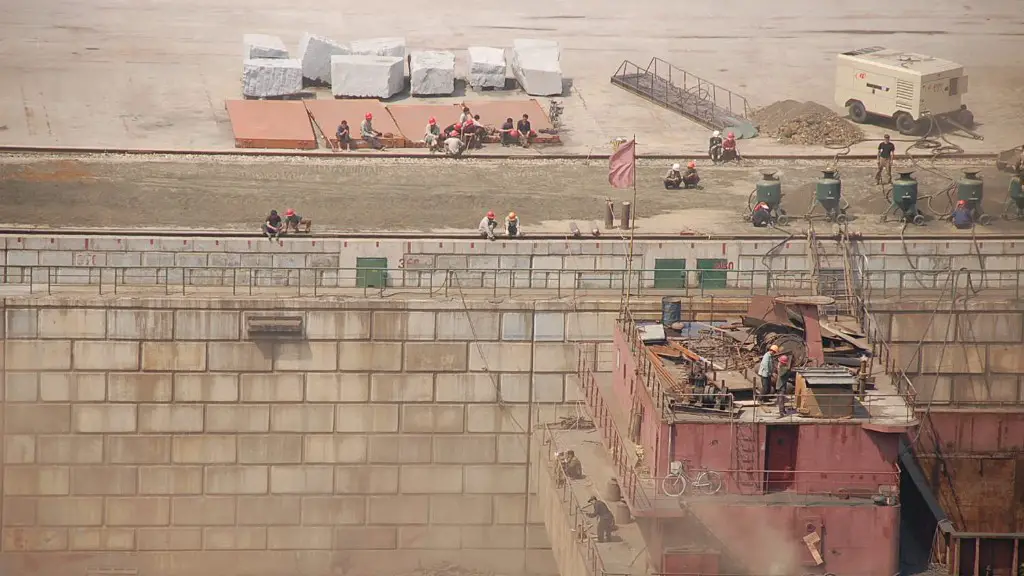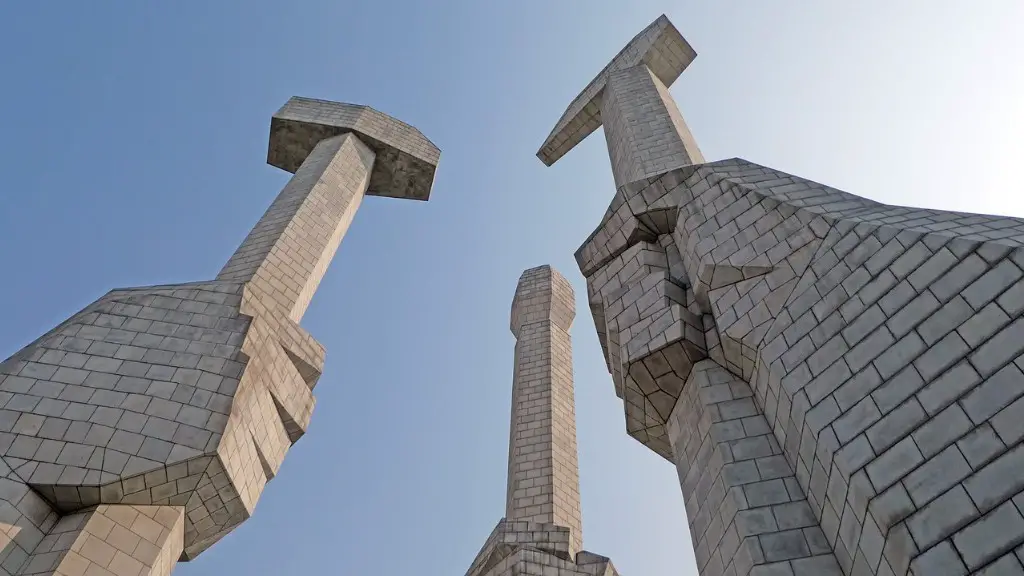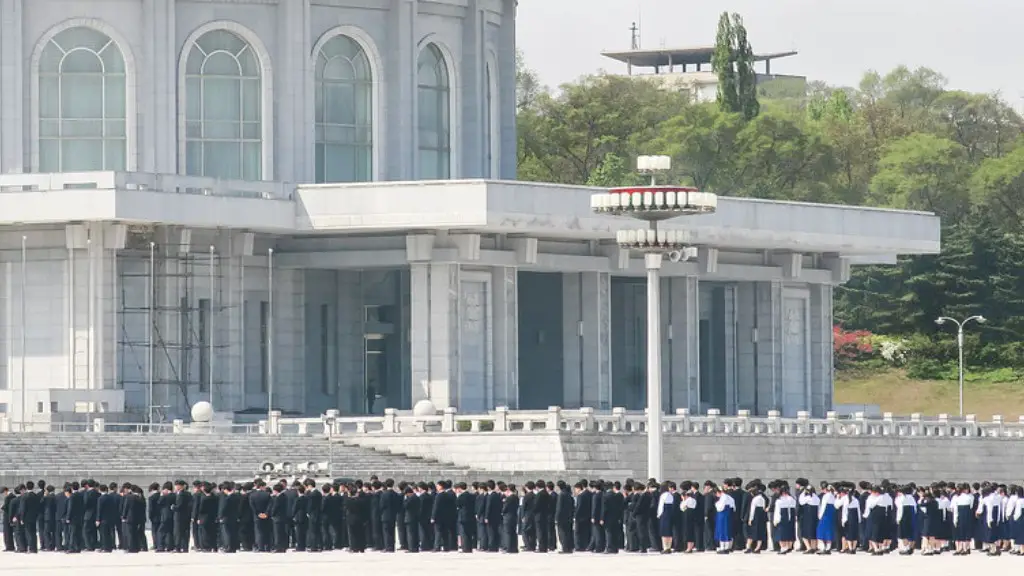For many years, the world has been living under the shadow of an ever-present risk of a North Korea War. North Korea has been embroiled in a tense standoff with the United States and its allies in the region, along with ongoing threats to use its nuclear arsenal. With tensions seemingly escalating with each passing day, it could only be a matter of time until all-out war with North Korea breaks out. What would North Korea war look like if that were to happen?
The answer to this question depends on how North Korea chooses to use its nuclear arsenal. If they launch a pre-emptive strike against its enemies with nuclear weapons, the conflict would be horrific. The death toll from such an attack would be catastrophic, and the subsequent fallout from radiation would spread far and wide. Additionally, the US and its allies would no doubt retaliate against North Korea with massive retaliation of their own.
Alternatively, should North Korea choose to use conventional weapons, it is likely that the conflict would still be devastating, but on a much smaller scale. In the event of a conventional war, both sides would suffer heavy casualties, but the death toll would likely still be a fraction of what it would be with a nuclear strike. In such a situation, both sides would need to be prepared for a long-drawn-out stand-off, with the potential for cyber and other non-conventional weapons to be introduced into the conflict.
In either scenario, it is important to note that North Korea would not be the only country fighting in such a war. With regional powerhouses China and Russia offering North Korea their support, it is likely that they would also become embroiled in the conflict. This could potentially escalate the conflict to a global scale, with the potential for the US and its allies to be drawn into a wider conflict with the two countries.
Given the potential consequences of such a conflict, it is understandably a scenario that countries around the world are desperate to avoid. For this reason, many world leaders have sought to put an end to the current stand-off between North Korea and the US and its allies. Countries have sought to initiate talks in a bid to bring an end to the crisis, but so far these efforts have fallen short of achieving any positive results.
Ultimately, a North Korean War would be catastrophic for the region and the world at large. The threat of a nuclear strike from North Korea looms large, and it is a threat that the US and its allies must take seriously if they are to avoid it. While diplomatic solutions would be preferable, it is clear that a long-term solution must be found to the current stand-off if we are to avoid the potential devastation of a North Korean War.
Impact Upon Regional and Global Politics
The impact of a potential North Korean War on regional and global politics cannot be overstated. In the event that war were to break out, it is likely that international tensions would greatly increase, as regional powers scramble to protect their interests. This could potentially lead to an increased risk of further conflicts in the region and beyond, as countries vie for position in order to gain an upper-hand in the volatile situation.
Furthermore, the conflict could also have a serious impact on global security, as countries attempt to reassess their positions in light of the instability created by a North Korean War. As countries become increasingly concerned about the security of their borders, it is likely that military presence in the region would increase, with the potential for further hostilities to break out amongst rival nations.
The economic impact of a full-scale North Korea War would also have far-reaching consequences. With North Korea among the world’s poorest nations and in desperate need of economic aid, any conflict involving the country is likely to have a severe impact on global trade and markets. The potential disruption to key markets and the economies of countries in the region could be catastrophic and long-lasting.
Finally, the human cost of such a conflict should not be underestimated. With huge numbers of people already displaced as a result of the current stand-off, any all-out war would result in a catastrophic number of casualties and devastating loss of life. In addition, the trauma of such a conflict could have long-lasting psychological effects on those living in the region.
The Role of the United Nations
In the event of a North Korean War, the United Nations (UN) would have a crucial role to play in helping to deescalate the conflict. As an international organisation with the authority to enforce resolutions, the UN would be able to place sanctions on North Korea and other warring nations, in an attempt to bring the conflict to an end.
The UN would also be able to provide essential humanitarian aid and relief. In the aftermath of such a conflict, the organisation would be able to help the countries affected to rebuild, as well as to provide assistance to the victims of the war. As such, the UN could play an invaluable role in helping the region to recover from the devastating effects that such a conflict would bring.
Finally, the UN’s role in resolving the current tensions between North Korea and its adversaries would be crucial. The organisation would have the authority to negotiate with all relevant parties in an attempt to bring an end to the stand-off, thus avoiding the risk of an all-out war.
US and Allied Strategies
At present, the United States and its allies are seeking to resolve the situation without the need for military intervention. Nevertheless, it is clear that they are prepared to do so if the current stand-off escalates further. For this reason, the US and its allies have been devising military strategies and practising war drills in the event that a conflict were to break out.
These strategies would likely involve a combination of targeted airstrikes and ground-level operations, in an attempt to contain the conflict while minimising casualties on both sides. Additionally, it is likely that the US and its allies would utilise advanced cyber-warfare to incapacitate elements of the North Korean military, in an attempt to limit the damage caused by any conflict.
Given the high stakes at hand, the US and its allies have also been enlisting the support of neighbouring countries to help police the region and ensure that any risk of conflict is limited. Countries such as South Korea, Japan and China have already had a role to play, both diplomatically and militarily, in attempting to bring an end to the current stand-off.
In addition, the US and its allies have also been utilising economic sanctions and the threat of further sanctions to pressure North Korea into ceasing their nuclear weapons program. In an attempt to deescalate the situation, these sanctions have been targeted at key North Korean entities, such as their military and government, in an attempt to weaken their power and limit their ability to launch a pre-emptive strike.
Implications of Nuclear Weapons
Despite the ongoing attempts to contain North Korea’s nuclear weapons program, it is undeniable that the country is still in possession of such weapons. In the event that war were to break out, it is likely that North Korea would attempt to use these weapons in order to strengthen their position. This could potentially have devastating consequences, both for the region and the world at large.
The consequences of a nuclear strike could be catastrophic, with huge casualties and devastating environmental damage both likely. In addition, the fallout from such an attack would be felt for years to come, not only in the immediate region but potentially around the world.
Furthermore, it is likely that the international community would respond with force in the event of a nuclear attack by North Korea. The potential retaliation from the US and its allies would no doubt lead to further escalation of the conflict, resulting in increased regional and global instability.
It is clear, then, that North Korea poses a huge threat to regional and global security. The country must be deterred from using its nuclear arsenal or else the consequences could prove to be catastrophic. As such, the international community must continue to do all they can to resolve the situation without the need for war.
International Cooperation and Diplomacy
Given the importance of avoiding a North Korean War, it is of paramount importance that the international community continues to work together to deescalate the situation. In order to do this, there needs to be a focus on international cooperation and diplomacy, with countries uniting to resolve the crisis through peaceful means.
This could involve increased efforts to engage with North Korea and attempt to initiate dialogue. It may also require the international community to provide economic assistance to the country, in order to help them to recover from the current stand-off and limit the potential for military conflict.
In addition, the international community could look to increase its diplomatic presence in the region, in an attempt to mediate between the US and North Korea. By doing so, there is the potential for the two sides to come to a peaceful resolution and avoid the need for full-scale war.
Ultimately, there is no single solution to the current stand-off between the US and North Korea. However, increased international cooperation and diplomacy could play a crucial role in averting the potential devastation of a full-blown war. If we are to avoid such a conflict, then it is imperative that countries around the world act together to bring an end to the current stand-off.





